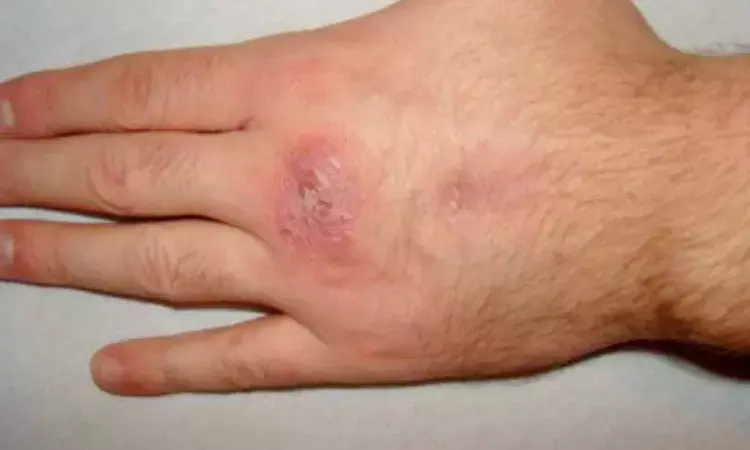- Home
- Medical news & Guidelines
- Anesthesiology
- Cardiology and CTVS
- Critical Care
- Dentistry
- Dermatology
- Diabetes and Endocrinology
- ENT
- Gastroenterology
- Medicine
- Nephrology
- Neurology
- Obstretics-Gynaecology
- Oncology
- Ophthalmology
- Orthopaedics
- Pediatrics-Neonatology
- Psychiatry
- Pulmonology
- Radiology
- Surgery
- Urology
- Laboratory Medicine
- Diet
- Nursing
- Paramedical
- Physiotherapy
- Health news
- Fact Check
- Bone Health Fact Check
- Brain Health Fact Check
- Cancer Related Fact Check
- Child Care Fact Check
- Dental and oral health fact check
- Diabetes and metabolic health fact check
- Diet and Nutrition Fact Check
- Eye and ENT Care Fact Check
- Fitness fact check
- Gut health fact check
- Heart health fact check
- Kidney health fact check
- Medical education fact check
- Men's health fact check
- Respiratory fact check
- Skin and hair care fact check
- Vaccine and Immunization fact check
- Women's health fact check
- AYUSH
- State News
- Andaman and Nicobar Islands
- Andhra Pradesh
- Arunachal Pradesh
- Assam
- Bihar
- Chandigarh
- Chattisgarh
- Dadra and Nagar Haveli
- Daman and Diu
- Delhi
- Goa
- Gujarat
- Haryana
- Himachal Pradesh
- Jammu & Kashmir
- Jharkhand
- Karnataka
- Kerala
- Ladakh
- Lakshadweep
- Madhya Pradesh
- Maharashtra
- Manipur
- Meghalaya
- Mizoram
- Nagaland
- Odisha
- Puducherry
- Punjab
- Rajasthan
- Sikkim
- Tamil Nadu
- Telangana
- Tripura
- Uttar Pradesh
- Uttrakhand
- West Bengal
- Medical Education
- Industry
Laundry Detergent Component May Weaken Skin Barrier, Potentially Contributing to Skin Conditions

Recent research conducted by Arturo O. Rinaldi and a team at the Swiss Institute of Allergy and Asthma Research (SIAF) has unveiled a concerning link between laundry detergents and their impact on the skin's protective barrier. The study suggests that the sodium dodecyl sulfate (SDS) component in laundry detergents may compromise the skin's integrity and potentially contribute to the development of atopic conditions.
This study was published in Allergy. The investigation involved the use of C57BL/6 mice, which were exposed to two common household laundry detergents, denoted as detergents A and B, at varying dilutions (1:100, 1:1000, and 1:10,000 with phosphate-buffered saline [PBS]). These detergents were applied via a skin patch for 4 hours. Notably, the exposure resulted in a marked reduction in electric impedance and increased transepidermal water loss (TEWL), indicating a weakening of the skin barrier.
The study's RNA sequencing analysis revealed a reduction in the expression of genes crucial for maintaining the skin's barrier integrity. In contrast, genes linked to lipid metabolic processes, keratinization, and epidermal cell differentiation were upregulated. Proteomics analysis showed a downregulation of proteins associated with cell adhesion and an upregulation of proinflammatory proteins.
The findings suggest that laundry detergents, particularly SDS, can significantly impact the integrity of the epidermal barrier. The study emphasizes the importance of further research to assess the long-term effects of detergents on the skin barrier, particularly in individuals with existing skin conditions.
Understanding the potential consequences of everyday products like laundry detergents on skin health is essential for maintaining and preserving the skin's protective function. This research serves as a valuable reminder of the importance of skin care and the need for ongoing investigation into the products we use in our daily lives.
Reference:
Rinaldi, AO, Li, M, Barletta, E, et al. Household laundry detergents disrupt barrier integrity and induce inflammation in mouse and human skin. Allergy. 2023; 00: 1-13. doi:10.1111/all.15891.
Dr Riya Dave has completed dentistry from Gujarat University in 2022. She is a dentist and accomplished medical and scientific writer known for her commitment to bridging the gap between clinical expertise and accessible healthcare information. She has been actively involved in writing blogs related to health and wellness.
Dr Kamal Kant Kohli-MBBS, DTCD- a chest specialist with more than 30 years of practice and a flair for writing clinical articles, Dr Kamal Kant Kohli joined Medical Dialogues as a Chief Editor of Medical News. Besides writing articles, as an editor, he proofreads and verifies all the medical content published on Medical Dialogues including those coming from journals, studies,medical conferences,guidelines etc. Email: drkohli@medicaldialogues.in. Contact no. 011-43720751


